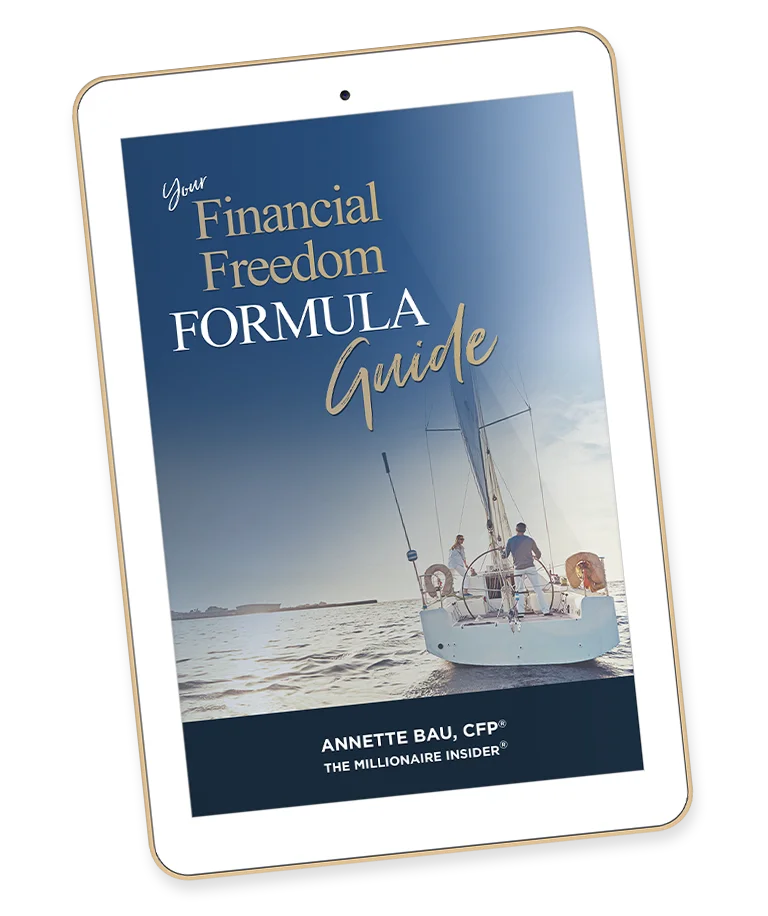It’s interesting how many people tell themselves they’re bad with numbers, or my favorite one is that I don’t do numbers. And my comment is, if you want to live a financially free life, you’ve got to know a few critical financial numbers. Not all numbers, but a few key ones.
And today, I will share three critical ones that are easy to master. And if you can get your focus around those, it’s going to literally change the trajectory of your life, your money, and ultimately, your business if you have one. So, stay tuned.
Summary: Wealth Inside and Out® Podcast – “3 Key Financial Numbers You Should Know”
We dive into:
- Your balance sheet and income statement, which are critical financials
- Quarterly or yearly reports you need to make a priority
- Important financial numbers that successful people prioritize
- Insight to help you assess your short and long-term financial health and stability
Welcome
Hi, my name is Annette Bau (bah oo).
I’m a Certified Financial Planner™ and founder of The Millionaire Insider®.
This is the Wealth Inside and Out® Podcast.
FREE Financial Freedom Formula Guide
Our free resource is the Financial Freedom Formula Guide. You can download the guide here: Financial Freedom Guide.
This resource provides critical  insight into securing a financial future and retirement you love. And one recommendation on your financial journey is to get clear on your end goal.
insight into securing a financial future and retirement you love. And one recommendation on your financial journey is to get clear on your end goal.
Disclosure
All materials and intellectual property are copyrighted by MillionaireSeries.com®.
This information is for educational purposes only. It is not intended to replace any advisor or specialist or provide investment, financial, tax, retirement, planning, or healthcare advice.
By accessing this content, you agree to hold MillionaireSeries.com® and its affiliates harmless for results achieved or not achieved.
“3 Financial Numbers You Need to Know”
So today, we’re diving into three financial numbers you need to know.
The P&L Statement

Let’s begin with your P&L statement.
P&L stands for Profit and Loss and shows what’s coming in and going out for a period of time.
The P&L starts with income from all sources. Examples include wages and salaries, distributions, dividends, gifts, royalties, and any other sources of income you receive.
Next, determine all your expenses every month.
Start with your personal expenses (also referred to as your cash outflow). It may include a mortgage, insurance, utilities, groceries, and car payments.
Other expenses include food, entertainment, supplies, and maintenance of your residence and car. You may also have a vacation fund. Anything you’re spending money on or have money you’re earmarking for each month should be added to the expense column.
Next, subtract your income number from your total expenses to determine your bottom-line profit or loss. I recommend you view your P&L monthly, quarterly, semi-annually, and annually to know your profit or loss.
The Balance Sheet
Your balance sheet is a statement of your assets (what you own) and liabilities (what you owe, also called debt), showing you your net worth.
Ideally, review your balance sheet at least annually unless you prefer to review it more frequently.
Business Numbers
You must know your bottom-line business numbers if you have a business. 
For example:
What is the cost of acquiring a client if you have a business? Let’s assume the average cost to acquire a client is $15 per lead. And the average sale you make is $1500.
That’s valuable information because it tells you you are earning 100 times the client acquisition cost. Now, it could be $150, on average, and that would be ten times the acquisition cost.
If the number is, say, for instance, $1000 cost and you only make $1500 per sale, that’s a lot less profit margin than a $150 cost per $1,500 sale.
Another important number is the lifetime value of your average client.
Many businesses acquire a client, sell them one thing, and then find another client to sell to. In many cases, this is a terrible model for everyone.
The goal is to acquire, nurture, serve, and care for them so they become clients for life. And I always recommend going deep versus wide because it’s almost always easier and more profitable.
If you get most clients via referrals, you won’t have an acquisition cost in dollars, but you will have time, which you need to factor into your calculation.
Many of us have watched The Shark Tank, and one of my favorite parts of that show is Kevin O’Leary saying, “You must know your numbers!”
Some people (mostly women) believe they are not good with numbers. Somewhere on their journey, they were told that money or numbers are hard or that “Women don’t do numbers.” This belief (hard-wired neural pathway) can be changed.
Creating New Neural Pathways AKA Habits)
We need to rewire that belief about numbers. It takes 18 to 254 days (on average 66) to change a belief or a neural pathway. So, start today and before you know it, you’ll have replaced that crazy belief with one that’s serving you.
The numbers we covered are a great place to begin in assessing your financial position and the health of your personal wealth and business profitability.
Additional Financial Numbers

These are some additional financial numbers that may be important to you depending on your situation:
- Cost of goods sold and operating expenses
- Annual report and gross profit
- Accounts Receivables and Payables
- Cash flows from operating
- Cost of a cash flow statement if applicable to your situation
- Goods or services expense
- Operating activities and expenses
- Personal and business investing and financing activities if applicable
Delegate, But Don’t Abdicate
I was at the National Speakers Association when three speakers shared that they almost went bankrupt at different times because they had employees stealing from their business.
You can delegate but don’t abdicate your accounting or planning. You must review all financial reports and know your financial numbers, including bottom-line profit or loss.
When I delegated my accounting, I spent more time than when I did certain elements myself. You must determine what you need or want to delegate and what you are better completing yourself.
I personally caught more inaccurate and even fraudulent charges when I completed elements of my accounting than my bookkeeper did.
Whatever you decide to do, you need to get in the driver’s seat of your financials. The more you tell yourself and create a story that it’s fun, the easier it will be to make it a priority.
Make Your Money a Priority
While money doesn’t need to be the end-all-be-all, it does need to be a priority. If you ever want to become financially free or retire, you’ve got to know the basic numbers at a minimum.
These essential financial numbers are not difficult and can be a game changer to your financial future.
Recap: “Financial Numbers You Need to Know”

Wasn’t that easy?
Profit and loss, balance sheet, and business numbers are not complicated. There’s no excuse. If I can do this, you can too! I’m not any better or worse at numbers than you.
It’s just a matter of doing it, making it a priority and a habit. And before you know it, you’ll think, this is easy. I can’t believe I didn’t do it before.
And then you’ll love it when you start seeing your net worth and income grow, and you have a more secure financial future ahead. It’s amazing. So, I’ll look forward to seeing you on our next episode.
Until then, take one action that will help you create a secure financial future and retirement you love.
Follow and Subscribe
If you love the content, please open the Apple Podcast on your iPhone. Scroll down to the bottom, click five-star review, and leave a review. We really appreciate it.
Click here to follow and leave a review.

